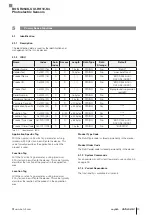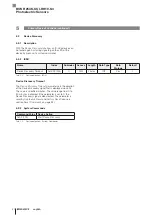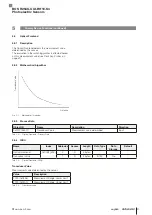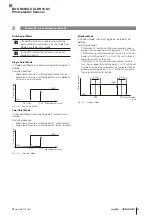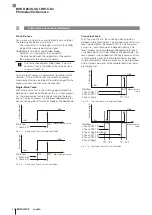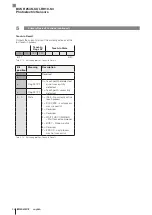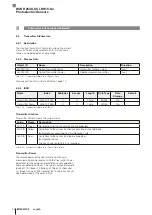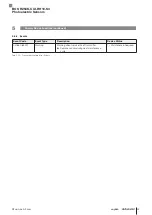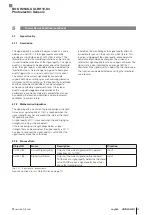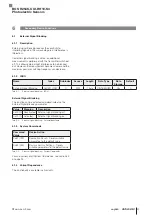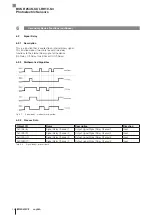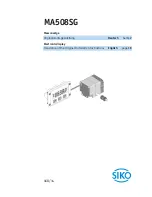
34
english
Teach Process
For a successful teach-in as well to directly set a setpoint,
the following conditions must be met:
– The setpoint that is to be taught must be in the validity
range of the measurement value signal.
Additionally in Two-Point and Window Mode:
– Setpoint 1 must be greater than setpoint 2.
– The distance between the setpoints must be greater
than or equal to the minimum hysteresis.
Due to the requirements listed above, it may be
necessary to vary the order of the setpoints for a
successful teach-in.
An active teach process is indicated by illumination of the
red LED. If the red LED flashes, the currently pending
measurement value is outside of the validity range (IO-Link
process) or a manual teach was not possible.
Single-Value Teach
With
Single-Value Teach
, the switching point (setpoint) is
defined via a teach point. Moreover, this is a static process,
i.e., the measurement value is constant during the teach
phase. The teach process is performed independently for
each switching point in Two-Point Mode or Window Mode.
Fig. 5-7:
High
SP1
Low
Workflow:
1. Teach SP1
Measurement value
Switching output
Single Value Teach in Single Point Mode
Fig. 5-8:
High
SP1
SP2
Low
Workflow:
1. Teach SP2
2. Teach SP1
Measurement value
Switching output
Single-Value Teach in Two-Point Mode
5
Primary Device Functions (continued)
Two-Value Teach
With
Two-Value Teach
, the switching point (setpoint) is
defined via two teach points. The average value of the two
teach points defines the setpoint. This is a static process
as well, i.e., each teach point is defined statically. The
teach process can be performed independently for each
switching point in Two-Point Mode or Window Mode. The
teach process is concluded with the Apply command; this
is only possible if each of the two teach points has been
taught. Alternatively, the teach process can be interrupted
with a Cancel command. All incomplete teach point pairs
are thereby lost.
Fig. 5-9:
High
SP1
TP1 TP2
Low
Workflow:
1. Teach SP1 TP1
2. Teach SP1 TP2
3. Teach Apply
Measurement
value
Switching output
Two Value Teach in Single Point Mode
Fig. 5-10:
High
SP1
TP1
TP1 TP2
TP2
SP2
Low
Workflow:
1. Teach SP2 TP1
2. Teach SP2 TP2
3. Teach Apply (optional)
4. Teach SP1 TP1
5. Teach SP1 TP2
6. Teach Apply
Measurement
value
Switching output
Two-Value Teach-In Two-Point Mode
BOS R254K-UUI-RH10-S4
Photoelectric Sensors
Summary of Contents for BOS R254K-UUI-RH10-S4
Page 1: ...deutsch Konfigurationsanleitung english Configuration Guide BOS R254K UUI RH10 S4...
Page 2: ...www balluff com...
Page 3: ...BOS R254K UUI RH10 S4 Konfigurationsanleitung deutsch...
Page 4: ...www balluff com...
Page 108: ......
Page 109: ...BOS R254K UUI RH10 S4 Configuration Guide english...
Page 110: ...www balluff com...










